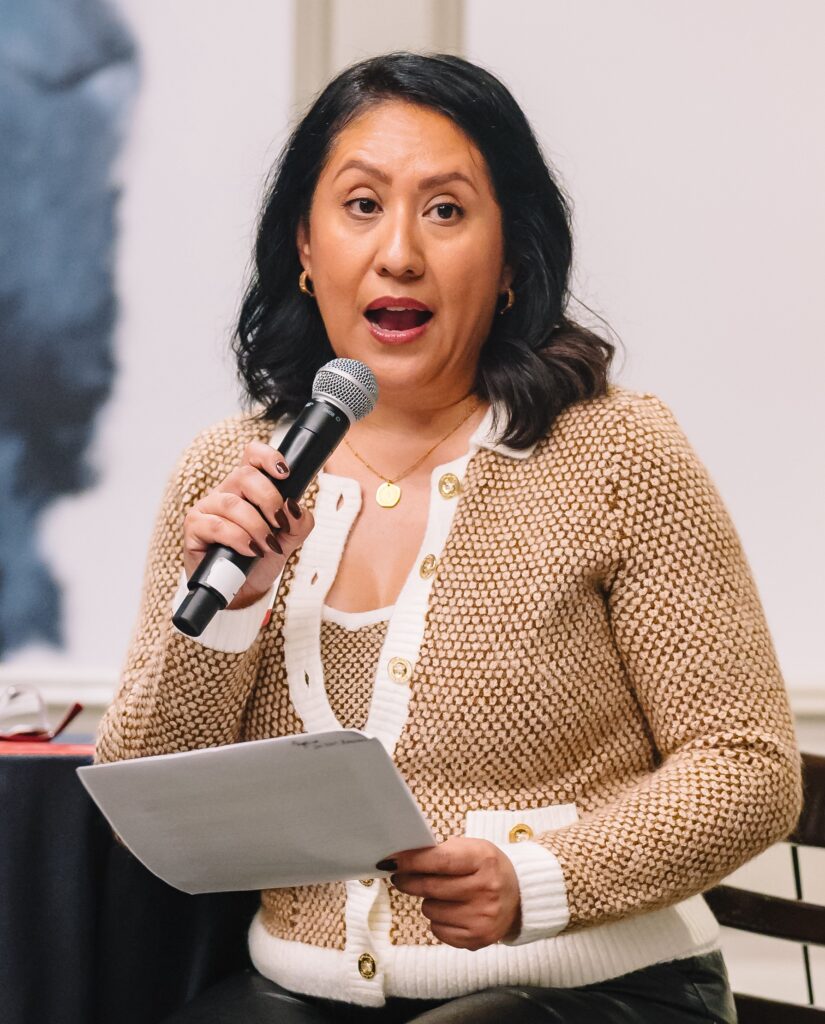By Angelica Solis-Montero | August 26, 2024

Baby Bonds are an increasingly popular bipartisan government policy in which every child born into poverty receives a publicly funded trust account at birth. This “start-up capital” allows young adults to access education, home ownership, and entrepreneurship, enabling them to build wealth and lead lives that are hopeful, fulfilling, productive, prosperous, and self-directed. Follow our Baby Blogs series to learn about the vision, politics, and people behind Baby Bonds and their transformative impact on the lives of young people, their families, communities, and our economy.
In this installment of Baby Blogs, Angelica Solis-Montero, chief policy officer of Education Leaders of Color (EdLoC), details why EdLoC is a strong advocate for wealth-building initiatives such as Baby Bonds, including the American Opportunity Accounts Act.
From a young age, I learned the importance of saving money by going to the bank regularly with my father, a small business owner. I remember the excitement my sister and I felt when we brought our piggy banks carefully filled with our weekly allowance to open our very own savings accounts. I still remember the woman who happily helped us and made sure we knew how important this milestone was. For years after, I kept track of my savings in a bankbook as I made deposits—and more importantly—didn’t make withdrawals. Having access to this small but meaningful sum of money early in life contributed to my ability to build a strong foundation and a brighter future for myself.
At Education Leaders of Color (EdLoC), a membership network of transformational leaders of color, we know that having the resources to build generational wealth helps people make the best choices for themselves, and their families. But, historically, communities of color have not been set up for financial success and the racial wealth gap continues to widen. White adults are more than twice as likely as Black and Brown households to receive considerable financial help from parents, and families of color often pass wealth in the opposite direction, from children to parents.
Not every child is able to experience the benefits of generational wealth, nor do they have the resources to envision a future where they can thrive. Yet policies and programs that help families set their children up to build generational wealth do exist—including Baby Bonds.
EdLoC prioritizes Baby Bonds in our Policy Agenda as one of the few ways we know we can equitably build wealth for children, especially those who are born into this world with little to no resources. Baby Bonds provide children with nest egg funds through government provided investments that they can access upon becoming an adult. As leaders of color, EdLoC’s membership network knows firsthand the impacts of biased policies that have intentionally stripped communities of color of wealth-building opportunities, from redlining to discriminatory lending practices. We also know the life-changing impact Baby Bonds could have for the young people of color we work with.

Pursuing higher education and establishing careers was a difficult journey for many EdLoC members, as is the case in many communities of color. Baby Bonds would make a crucial difference by leveling the playing field and giving young people of color a choice to invest in their own education, home, business, and more. There is no singular approach to generational wealth building, but Baby Bonds can play a crucial role in solving racial wealth gaps—especially when paired with other policies we are advancing.
Baby Bonds could become a reality for millions of children in the United States. The American Opportunity Accounts Act (AOAA), most recently reintroduced in 2023, would create savings accounts for babies with automatic deposits of $2,000 each year until they turn 18—starting with those who are born with the least amount of resources. EdLoC will continue to elevate our members’ voices to support Baby Bonds. We are a part of the National Baby Bond Coalition that advocates for the AOAA. EdLoC also recently held an Advocacy Day in D.C., where we spoke with congressional leaders about a policy agenda that includes the AOAA.
While EdLoC is building momentum to pass the AOAA, states across the country have enacted legislation that investigates the impact of Baby Bonds in their localities—including D.C., Connecticut, and California. What’s happening in these states will show how Baby Bonds are part of a policy solutions package that will care for young people of color.
There are tangible things each of us can do to advocate for Baby Bonds in our own state and nationally. It’s incredibly important to pay attention and engage in efforts where you live. On the national level, it’s crucial to keep showing congressional representatives and senators our support of Baby Bond legislation.
From paying for college, to starting a business, to buying a home, Baby Bonds lay a path for young people of color and their families to achieve greater financial stability and build wealth to last generations.
Angelica Solis-Montero is the chief policy officer of EdLoC. Angelica has dedicated her career to improving equity for underserved communities in education, health, economic development, and civic engagement throughout Los Angeles. She is also on the Executive Committee of the City of Los Angeles’ Human Relations Commission, a Coro Women in Leadership Alum, and formerly a national fellow of the “Lead the Way Leadership Initiative for Emerging Women of Color Executive Directors” at New York University’s Robert F. Wagner Graduate School of Public Service.
If you missed previous installments of our Baby Blogs series, read them here.
To share feedback on this blog, or for questions about Baby Bonds, email David Radcliffe at radclifd@newschool.edu.
To learn more, explore our Baby Bonds resources.

